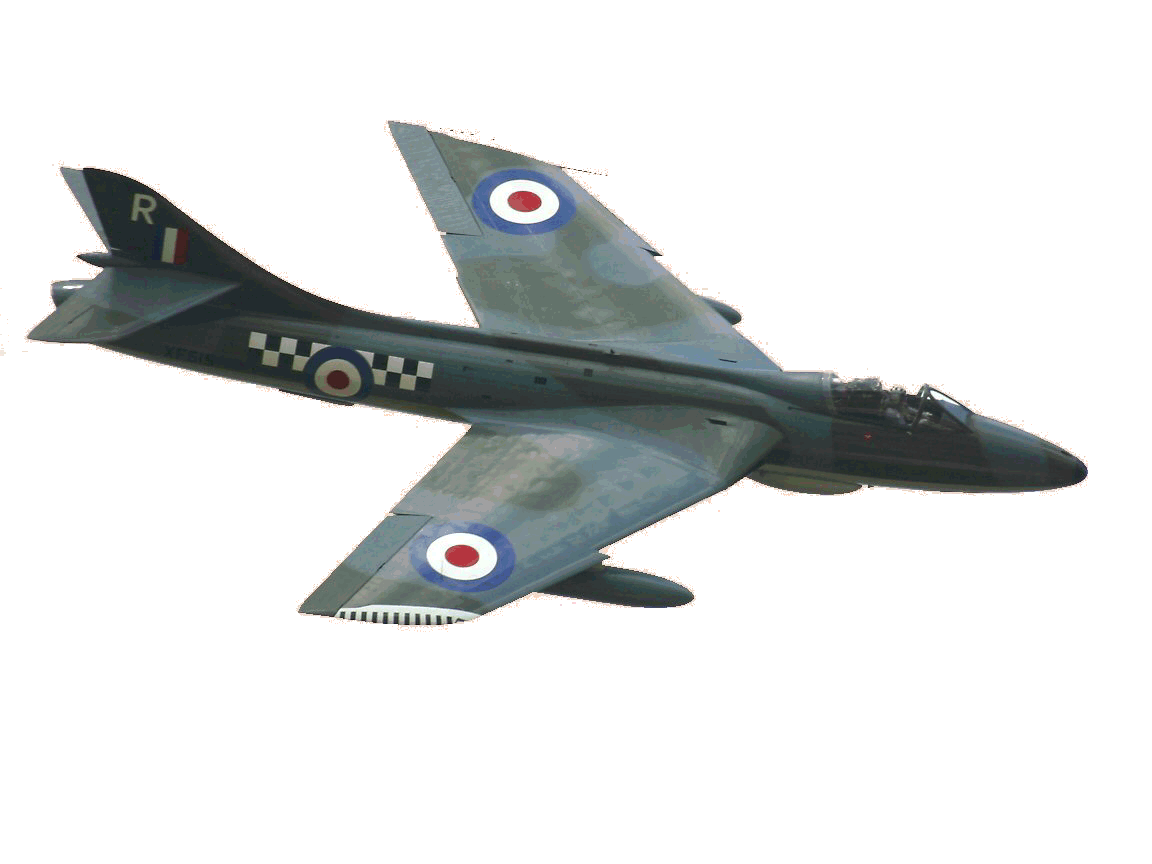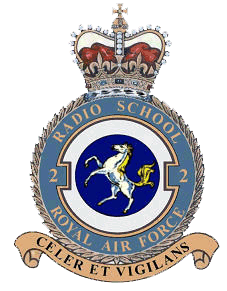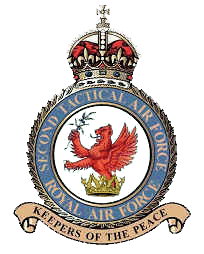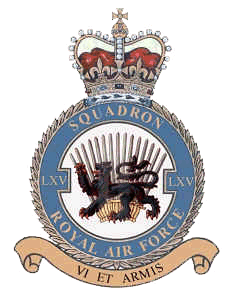| Home | R.A.F. Photo Album |
On this pages I recall some experiences of my R.A.F. service. I would love to hear from anyone who remembers me, shares my experiences, or who recognises themselves in any of the photographs in the photo album.
When I was called up for National Service in June 1954 I decided that I would like to learn a trade in the R.A.F. that involved electronics. I was told that I would have to sign on for 4 years
and I could then become an Air Radar Mechanic. I agreed and was posted to R.A.F. Padgate to do my 8 weeks "square bashing". I remember well, the reception on entering the airman's mess where
the inmates cheered, stamped their feet and banged their eating irons on the tables and sang to the tune of "The Mountains of Mourne":-
Padgate Oh Padgate's a wonderful place,
but the organisation is a F*****g disgrace,
there's' Corporals and Sergeants and Flight Sergeants too,
with their hands in their pockets and f**k all to do.
For all that they teach us, we might as well be
shovelling s**t on the Isle of Capri.
This ritual, in which we enthusiastically participated, was repeated every week to welcome the new entries! I also remember attending my first Rugby League Match at Warrington, being ordered to cut the grass
outside our hut with my eating irons and after passing out, attending a party where I got drunk for the first time in my life (unfortunately not the last!) and then on returning to the camp, being stopped
at the guardroom because my cap badge had been stolen and due to my intoxication, I could not explain what had happened. Fortunately as most of the returning revelers had a similar problem, the Corporal S.P.
at the gate did not feel he was able to arrest us all and let us through, to stagger back to our huts!
I was posted to R.A.F. Yatesbury to join my Air Radar Mechanics course which I think was due to last 12 weeks, however after 8 weeks
we took a test in which I scored high marks and was given the option to transfer to a 48 week Air Radar Fitters course, this I jumped at as, on completion, I would become a Junior Technician with more pay and promotion
prospects. On joining ARF 59 I found to my surprise that all the participants except for an ex "brat" SAC were National Service personnel. I believe that the recruiting Sergeant when I signed on had mislead
me in order to get me to enlist as a regular airman however, in hindsight, I have no regrets as I thoroughly enjoyed my four years service in the R.A.F.
The training at Yatesbury was exceptionally good, we learnt some basic electronics,
then specialist radar circuits such as multivibrators, flipflops etc. and then about components,
aerials, waveguides, magnetrons, rhumbatrons, klystrons etc. We went on to learn about specific
Radar equipments, Rebecca 4 ,
Gee III, I.F.F. and BABS. I believe I learnt far more in my one years
training at Yatesbury than in my subsequent 4 years study at Kingston Technical College for my
Higher National Certificate in Electronics.
Some things that I remember from my year at Yatesbury
are travelling home to Epsom weekends on the "Sodbury Queen" coaches, dances in the 4 Wing NAAFI,
pop songs of the period, my favourite singer was Ruby Murray
who sang "Softly Softly" "Evermore", "Happy Days, Lonely Nights" "Have you ever been lonely" etc.,
dancing to the music of the Johnny Styles Big Band at the Majestic Ballroom Swindon.
Also a young airman called Derek Ibbotson
who I remember won every race from 400 meters upwards at the station sports day (he went on to become the best U.K. miler and held the world record of 3 minutes 58.2 seconds from July 1957 to August 1958)
Chiefy Dunlop in the Guardroom was greatly feared by all of us trainees until he suddenly disappeared, the rumour was that he was guilty of some "misconduct" with a young airman!
Having graduated as Junior Technicians in August 1955, we were all excited to find out our next posting,
I was hoping to be sent to the Far East but surprisingly all the National Servicemen were sent there and the
Regulars to the 2nd Tactical Air Force in Germany. After embarkation leave we caught the troopship which
travelled from Harwich to the Hook of Holland, it was a rusty old tub called Vienna, built in 1929 and with
which I was to become quite familiar over the next 2½ years! I believe it was scrapped in 1960.
From the Hook we travelled to RAF Goch by train which I remember was quite comfortable and better than the
British trains of that period, even the food was quite good!.
At Goch we were given our final destinations, I was posted to the Tech Wing of R.A.F. Jever
where I was to remain for the next two and a half years, all I knew was that it was somewhere in Germany and as
I was the only person to be sent there, I was given a travel voucher and was told which train to catch and
to change at Bremen and then Oldenburg for Varel which was the closest railway station to Jever.
This was quite daunting to an 18 year old who had never travelled in a foreign country and couldn't
speak the language, but somehow I successfully navigated to Varel station but by this time it was dark and there
was no one there to meet me. I telephoned RAF Jever and some 2 hours later an R.A.F. Volkswagen driven by a member
of the G.S.O. (German Service Organisation) turned up to transport me the last 15 or so miles.
It turned out that Jever was in Ostfriesland in the North West of Germany, not far from the ex U-Boat base of
Wilhelmshaven on the North Sea coast.
There were four Squadrons based in Jever, 4, 93, 98 and 118, all equipped with Hawker Hunter fighters.
They were initially fitted with Rebecca 7 radar and later with Radar Ranging and Rebecca 8.
As the only training I had had was in the very different Rebecca 4, I was immediately sent to the nearby station at R.A.F. Oldenburg for a couple of weeks to learn
about Rebecca 7 but soon after my return to Jever, I was sent back to Yatesbury for a proper Rebecca 7 course.
I was subsequently to return to Yatesbury twice during 1956 for courses on Radar Ranging and Rebecca 8.
The officer in charge of the Tech Wing Signals Section was Flt. Lt. Topp, the Radar Officer was Fg. Off. A. Avery (a keen rugby player) and the Senior N.C.O.
was Chiefy Jock Patterson who was in hospital when I arrived, having while being very drunk, jumped out of a 1st Floor window in the Sergeants Mess and had broken both his legs!
His deputy was Sgt. Lofty Barker, a very nice gentleman, other names I remember are Cpl Denny Beale, Cpl Dick Ford (my room mate), Cpl Terry Chubb (a P.T.I.), Johnny Shaw and Mike Fleet,
who became an international athelete.
I played on the station Badminton Team and remember a visit to R.A.F. Sylt in the middle of winter, it was so cold that we had to wear our pyjamas under our uniforms and the sea was frozen.
I also played in the 2 T.A.F. Championships at R.A.F. Wildenrath, lost in the first round, but got to the final of the plate competition!.
Very soon after arriving at Jever I was introduced to the local "Night Spots". The most infamous was the St. Anantor, better known to us airman as the T.K. (Titten Keller),
run by a large German gentleman called Willi Brandt (no relation to the mayor of Berlin and later Bundeschancellor!)
Before going out, we used to go to the NAAFI to stock up with a pack of 200 cigarettes (used as illegal tender) and then sit at the bar drinking and listening to Elvis Pressley on the
Juke Box and chatting to the barmaid called Alice who plied us with free drinks when Willi Brandt's back was turned. On Saturday and Sunday evenings we often went to the local Dance Hall
called the Deutcheshaus, where there was a very good dance band, often supplemented by a brilliant amateur Jazz Band from R.A.F. Jever called the Jade Basin 5+1.
I remember the waiter there was called Herr Jansen who had a pretty blond daughter who often joined us at our table. Other nearby Hostelries that we visited were the Foresthaus in Upjever,
Caffehaus Varel, Strandhalle and Atlantic Bar in Wilhelmshaven.
While at Jever I had a succession of cars starting with a 1949 Mercedes 170v,
followed by a 1954 Mk1 Ford Consul
that had been crashed by it's previous owner and repaired, unfortunately it suffered from a slightly warped chassis but always elicited a smart salute from the guard on entering and exiting the main gate!
During my last year at Jever I purchased a Messerschmitt KR175
this was great fun to drive, had a windscreen wiper that was manually operated and strong elastic bands for the rear suspension!
With its handlebar steering it was very controllable in ice and snow and if it did get stuck, you just jumped out and ran alongside until traction was recovered.
We used to go dacing nearly every weekend and after a few months, while dancing in the Deutcheshaus in Jever, I met a very attractive young lady who I dated regularly and in June 1957 we became engaged to be married.
By this time I was becoming reasonably proficient in speaking the German language, good enough to ask her father for his daughter's hand in marriage! Fortunately his answer was in the affermative!
In January 1958 my 2 1/2 years in Germany,was completed and I was posted to 65 Squadron Duxford in Cambridgeshire to serve out the last few month of my 4 years service. I arrived to find that my main task would be to fit
the Squadron's Hunters with Radar Ranging. As I had been working in Tech Wing at Jever on Servicing Rebecca 8 and Radar Ranging I thought there would be no problems. It turned out that was not to be the case,
as invariably on every aircraft there were open circuit connections in the 32 pin connection cable between the gunsight and the Radar unit. I spent hours, checking these cables in situ as they were already
fitted in the aircraft when it was built and could not easily be removed. Eventually the problems were solved and the Squadron was completely fitted before it was my time to be demobbed in May.
I did hear that the Pilots did not think much of Radar Ranging and preferred the old manual twist grip.
 R.A.F. Photo Album |
 R.A.F. Yatesbury |
 R.A.F. Jever |
 65 Squadron R.A.F. Duxford |

